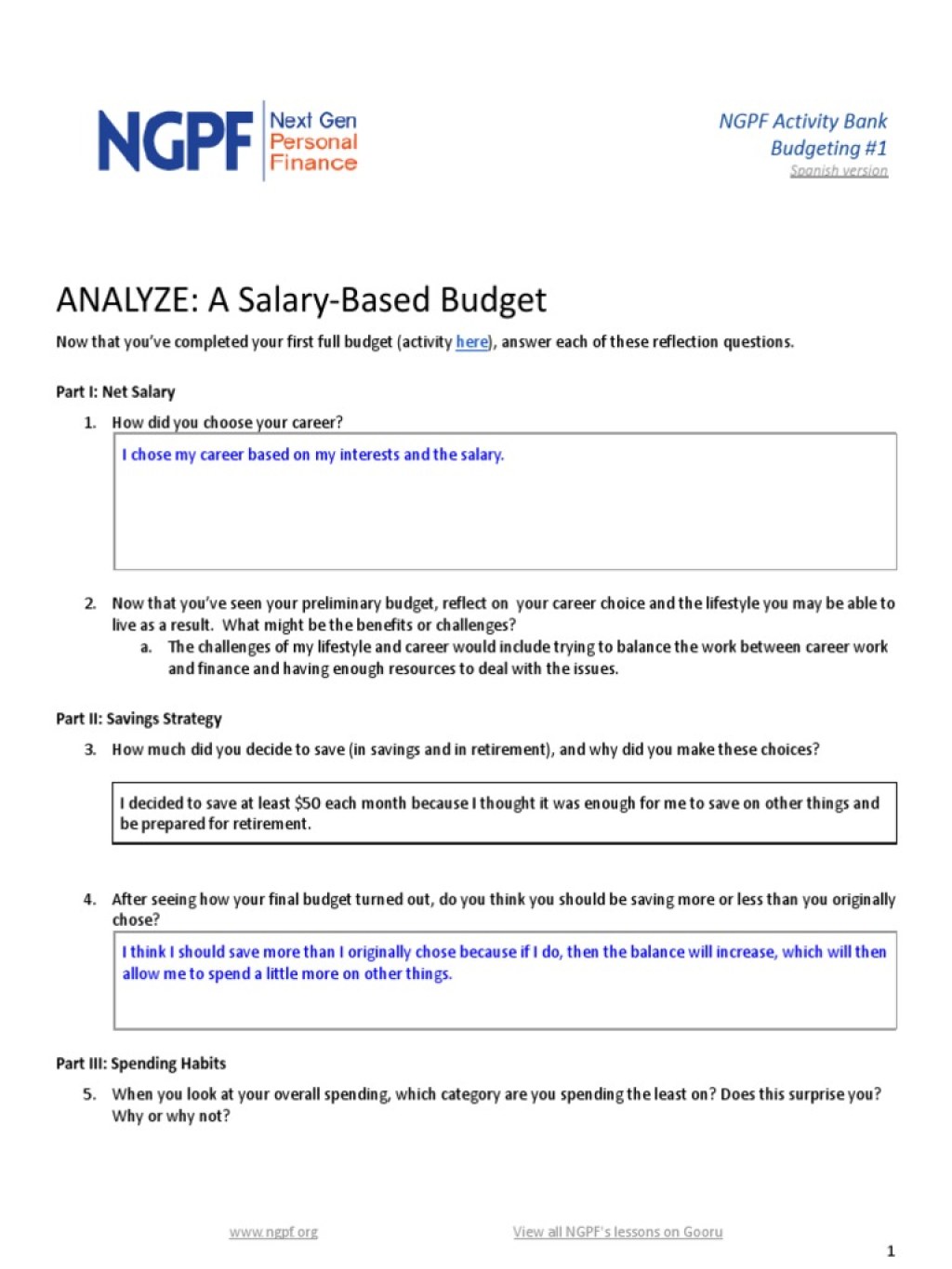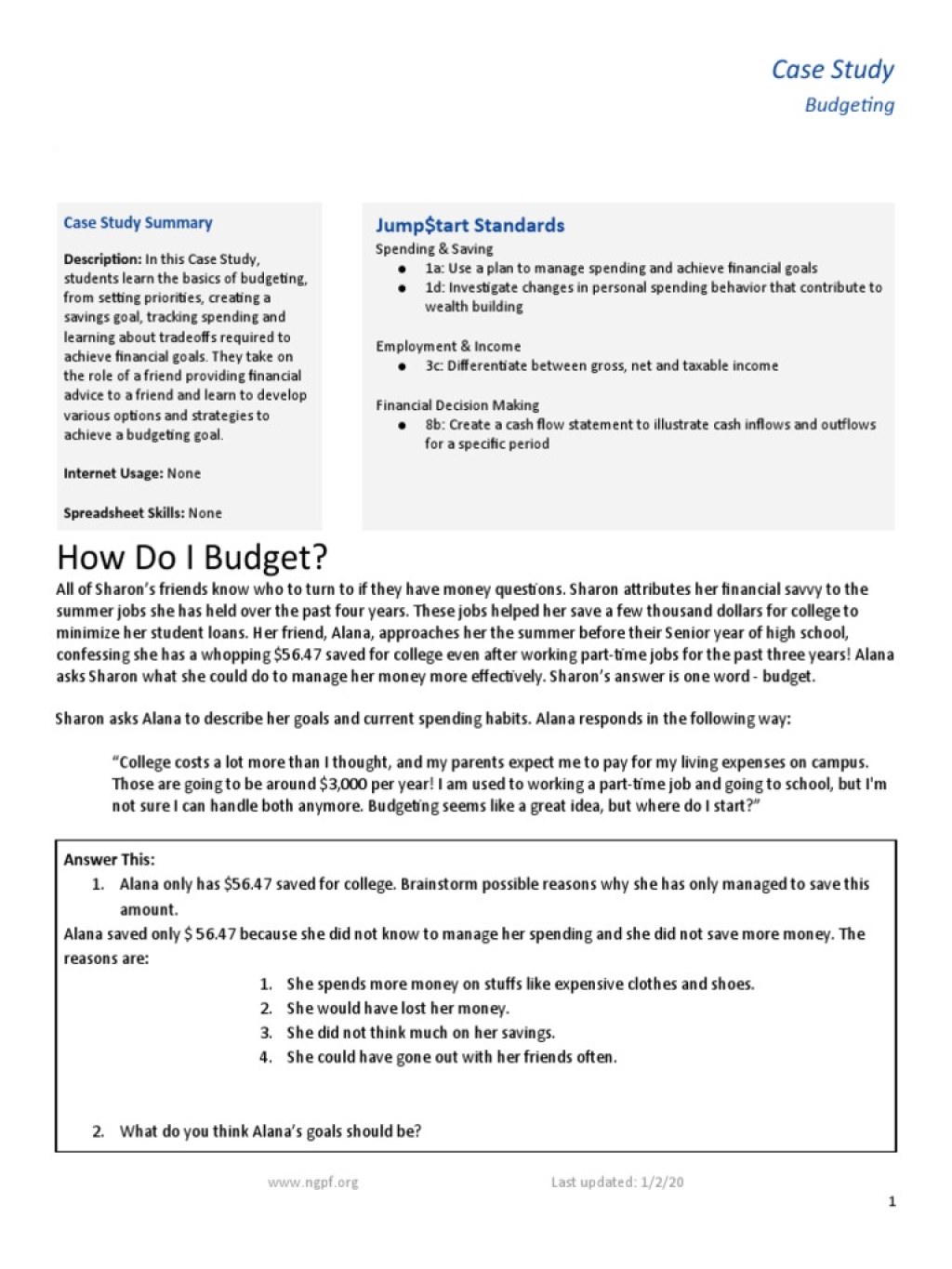6.2 Budgeting Strategies Answer Key
Introduction
Dear Readers,
Welcome to our article on the answer key for 6.2 budgeting strategies! In this article, we will provide you with comprehensive information about the budgeting strategies answer key, including its definition, who can benefit from it, when and where it can be applied, why it is important, and how it can be implemented. We hope that this article will be informative and beneficial for you in understanding the key aspects of budgeting strategies.
What is the 6.2 Budgeting Strategies Answer Key?

Image Source: scribdassets.com
🔑 The 6.2 budgeting strategies answer key refers to the set of strategies and techniques used to effectively plan and allocate financial resources in order to achieve financial goals. These strategies help individuals and organizations make informed decisions regarding their income, expenses, savings, investments, and debt management.
Who Can Benefit From the 6.2 Budgeting Strategies Answer Key?
🤔 The answer key for 6.2 budgeting strategies can benefit individuals, families, businesses, and organizations of all sizes. Anyone who wants to improve their financial management skills, optimize their budgeting practices, and achieve their financial goals can benefit from implementing these strategies. It is especially useful for individuals and organizations facing financial challenges or seeking to enhance their financial stability.
When and Where Can the 6.2 Budgeting Strategies Answer Key be Applied?
📅 The 6.2 budgeting strategies answer key can be applied in various scenarios and locations. It can be used by individuals to manage personal finances, by families to budget for household expenses, by businesses to plan their budgets and track expenses, and even by non-profit organizations to effectively allocate their resources. These strategies are applicable in both personal and professional settings, and their implementation can lead to better financial outcomes.
Why is the 6.2 Budgeting Strategies Answer Key Important?

Image Source: scribdassets.com
💡 The answer key for 6.2 budgeting strategies is important because it provides a structured approach to financial planning and management. By implementing these strategies, individuals and organizations can gain better control over their finances, reduce financial stress, make informed financial decisions, and work towards achieving their short-term and long-term financial goals. These strategies also promote financial discipline, help identify areas for improvement, and enable individuals and organizations to make adjustments to their budgeting practices as needed.
How Can the 6.2 Budgeting Strategies Answer Key be Implemented?
📝 The implementation of the 6.2 budgeting strategies answer key involves several steps. Firstly, individuals or organizations need to assess their current financial situation, including income, expenses, debts, and savings. Then, they can set specific financial goals based on their needs and priorities. Next, they can create a budget plan that outlines their income sources, fixed expenses, variable expenses, savings goals, and debt repayment strategies. Regular tracking and monitoring of expenses are also crucial. Finally, adjustments can be made as needed to ensure that the budgeting strategies align with the financial goals.
Advantages and Disadvantages of 6.2 Budgeting Strategies Answer Key
Advantages:
1. 🌟 Improved Financial Control: Implementing budgeting strategies provides individuals and organizations with better control over their financial resources, leading to a more stable financial situation.
2. 💰 Increased Savings: By allocating specific amounts towards savings goals, individuals and organizations can build up their savings over time and create a financial safety net.
3. 📉 Debt Reduction: Budgeting strategies help individuals and organizations manage their debts more effectively, leading to debt reduction and improved financial health.
4. 🔄 Enhanced Decision Making: With a clear budget plan, individuals and organizations can make informed financial decisions and prioritize their expenses based on their goals and priorities.
5. ⏰ Time and Resource Optimization: Proper budgeting allows individuals and organizations to optimize their use of time and resources by eliminating unnecessary expenses and focusing on activities that yield the most value.
Disadvantages:
1. 💸 Initial Effort: Implementing budgeting strategies requires time and effort to analyze financial situations, set goals, and create a budget plan.
2. 👥 Lifestyle Adjustments: Budgeting may require individuals and organizations to make some lifestyle adjustments, such as cutting back on discretionary expenses or finding alternative ways to meet their needs.
3. 📉 Unexpected Expenses: Despite careful planning, unexpected expenses can arise, which may require adjustments to the budget plan and potentially disrupt financial goals.
4. 💼 Business Considerations: Businesses implementing budgeting strategies need to consider factors such as market conditions, competition, and economic trends that may impact their financial stability.
5. ⏳ Learning Curve: Individuals and organizations new to budgeting strategies may experience a learning curve in understanding and implementing these strategies effectively.
Frequently Asked Questions (FAQs)
Q1: Can budgeting strategies help with debt repayment?
A1: Yes, budgeting strategies can be highly effective in managing and repaying debts. By allocating specific amounts towards debt repayment and prioritizing debt reduction, individuals and organizations can make progress in becoming debt-free.
Q2: How often should a budget plan be reviewed and adjusted?
A2: It is recommended to review and adjust a budget plan regularly, ideally on a monthly basis. This allows for tracking expenses, identifying areas for improvement, and making necessary adjustments to ensure the budget aligns with financial goals.
Q3: Can budgeting strategies be applied to personal finances only?
A3: No, budgeting strategies can be applied to personal finances, household budgets, business finances, and even non-profit organizations’ resource allocation. The principles and techniques can be adapted to various financial scenarios.
Q4: What if I have irregular income? Can budgeting strategies still be useful?
A4: Absolutely! Budgeting strategies can be adapted to accommodate irregular income. By estimating and averaging income over a certain period, individuals and organizations can create a budget plan that considers both high and low-income months.
Q5: Can budgeting strategies help achieve long-term financial goals?
A5: Yes, budgeting strategies are instrumental in achieving long-term financial goals. By setting and regularly contributing towards specific savings goals, individuals and organizations can make progress towards their desired financial milestones.
Conclusion
In conclusion, the 6.2 budgeting strategies answer key provides a valuable framework for financial planning and management. By implementing these strategies, individuals and organizations can gain better control over their finances, reduce stress, and work towards achieving their financial goals. The advantages of budgeting strategies, such as improved financial control, increased savings, and enhanced decision-making, outweigh the disadvantages, such as initial effort and lifestyle adjustments. By regularly reviewing and adjusting the budget plan, individuals and organizations can ensure that their budgeting practices align with their evolving financial needs. We encourage you to start implementing these strategies and take control of your financial future!
Final Remarks
Disclaimer: The information provided in this article is for general informational purposes only and should not be considered as professional financial advice. We recommend consulting a certified financial advisor or professional for personalized guidance regarding your specific financial situation and goals. The use of any information in this article is at your own risk.